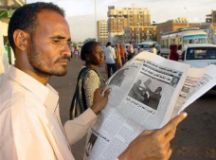Journalists say Sudan prevents media support for UN resolution
Sept 12, 2006 (KHARTOUM) — Sudanese journalists accused the government Tuesday of imposing press restrictions in order to prevent media support for a UN resolution which calls for the deployment of UN troops in the country.
 Several newspaper editors complained of having had newspaper articles confiscated under the pretext of “protecting journalists” following the killing of a prominent Islamist journalist last week.
Several newspaper editors complained of having had newspaper articles confiscated under the pretext of “protecting journalists” following the killing of a prominent Islamist journalist last week.
“They came to the newspaper at 11:00 last night and collected a number of news reports, including my column which was a commentary on a recent statement by senior ruling National Congress Party Nafie Ali Nafie on his relationship with Vice President Ali Osman Taha,” Al-Sahafa daily’s editing adviser Haider al-Mikashfy said.
But authorities “are likely looking for reports or materials supporting Resolution 1706,” he said.
On August 31, the Security Council passed resolution 1706 which authorized the deployment of up to 20,000 UN peacekeepers to take over from the cash-strapped and ill-equipped African Union (AU) forces in Darfur which has failed to stem the bloodshed.
But the Sudanese government has consistently rejected the option of a UN deployment in the war-torn region and instead dispatched its own forces to the western region.
The deputy editor-in-chief of Al-Sudani daily newspaper, Noureddine Medani, said that security officials visited his newspaper’s offices Monday night and collected reports and columns connected with recent demonstrations and trials in the country.
Medani said the authorities used last week’s killing of prominent Sudanese journalist Mohamed Taha Mohamed Ahmed as a pretext for the restrictions saying it was “for the protection of journalists,” he said.
“They alleged that they are doing this for our protection but it is only a return to the old censorship,” he said.
Executives of Al-Ayam daily newspaper also complained that several portions of their newspaper were cut out Monday night.
Yassir Arman, Deputy Secretary General of the Sudan People’s Liberation Movement (SPLM), a former rebel group which signed a peace deal with Khartoum in January 2005 to end a bitter north-south war, strongly denounced the restrictions.
“The recent return of censorship and monitoring of the newspapers and the media in general is a violation of the constitution and the bill of rights,” Arman said.
“It is unacceptable and it makes democratic transformation meaningless,” said the senior SPLM official.
Prior to the signing of the 2005 peace deal, Sudan was crippled by stringent media restrictions which began to ease with a new constitution which called for more freedom of the press.
“The free media is a mirror of the society and transparency and rule of law,” Arman said.
“It is a title of the transitional period and without it the (peace deal) will be meaningless and spiritless,” said Arman who threatened to quit his other role as chairman of the parliamentary information committee should the restrictions continue.
“It is almost impossible to carry out democratic change and to implement the (peace deal) without free press and media,” Arman warned.
Following the signing of the deal, the SPLM joined a national unity government in 2005, ending the 21-year-old war between Beshir’s Islamist regime and the mainly Christian southern rebels that killed 1.5 million people and displaced four million.
(ST/AFP)
